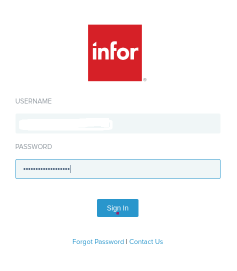Infor Testing
|
|
Infor was recognized as a leader in the 2024 Gartner® Magic Quadrant™ for Cloud ERP for product-centric enterprises, which shows its popularity and usability as an ERP system. Infor ERP is a software solution designed to help organizations manage and streamline their business operations.
It contains various modules and functionalities to cover various organizational departments. Which include finance, human resources, food and beverage, manufacturing, supply chain, fashion, and customer relationship management, etc.
Modern technologies, such as cloud computing, artificial intelligence, and data analytics, deliver real-time insights, improve collaboration, and drive innovation.
Let’s look at the key features of Infor ERP:
- Industry-Wide Solutions: Provides tailored ERP solutions for specific industries. It reduces customization and aligns with industry standards.
- Cloud-Based: Operates on AWS through Infor CloudSuite. It offers scalability, security, and reduced infrastructure costs.
- Modern UX: An intuitive interface enhances usability and reduces the learning curve.
- AI and Data Analytics: Integrates Coleman AI to automate tasks, predict outcomes, and deliver real-time insights for informed decisions.
- Integration Support: Uses ION middleware to integrate with third-party tools and legacy systems for unified operations.
- Planning and Scheduling: This company offers tools for production scheduling and demand forecasting, which helps to optimize workflows and resource utilization.
- Supply Chain Management: Includes inventory, procurement, and logistics tools to streamline and optimize supply chain operations.
- Financial Tools: Provides robust tools for accounting, budgeting, and compliance, ensuring accurate and transparent financial operations.
- Scalability and Flexibility: Supports multi-language, multi-currency, and multi-site needs. You can scale it with the growth of businesses.
- Mobile Access: Enables real-time access via mobile devices. So that you have the flexibility and great team collaboration.
Testing Infor ERP
Testing Infor applications is a vital process that ensures the ERP system functions as intended, seamlessly integrates with other software systems, and aligns with the business requirements of the organization. Since ERP systems like Infor are the backbone of business operations, any malfunction or misalignment can result in operational inefficiencies, financial losses, or compromised data integrity.
The testing process spans several stages, starting from planning and requirement analysis to execution and validation.
Let’s understand how to approach this process effectively:
- End-to-End Testing: During E2E testing, you need to validate the complete business processes. You test the user workflows across modules and integrations. You should test that the system functions cohesively, covering real-world scenarios from start to finish. Read: How to do End-to-end Testing with testRigor.
- Integration Testing: You need to test that Infor ERP easily integrates with other systems within an organization. It validates data transfers, communication between modules, and the operations of Infor ERP with third-party software.
- Functional Testing: Verifies that Infor ERP’s modules and features work as expected. You need to create tests to validate specific workflows, such as order processing, inventory management, financial transactions, etc.
- Regression Testing: Tests that recent updates or configuration changes do not create new defects in previously working modules of Infor ERP. Read: What is Regression Testing?
- Usability Testing: Focuses on the user experience (UX) within Infor ERP. It tests the system’s interface, navigation, and overall user-friendliness. So that the users can work easily and intuitively with the software.
- Performance Testing: Tests Infor ERP’s speed, responsiveness, and scalability. It includes tests like load testing to check how the system handles increased user loads. Also, stress testing to identify potential performance bottlenecks.
- User Acceptance Testing (UAT): It involves end-users in testing to ensure Infor ERP meets their requirements and is user-friendly. It validates that the system is in sync with real-world scenarios. Read: User Acceptance Testing: Manual vs. Automated Approaches.
- Security Testing: Identifies vulnerabilities and tests that sensitive data is protected within Infor ERP. Techniques like penetration testing can be used to assess the system’s behavior towards security threats. Read more about Security Testing.
- Accessibility Testing: Checks if Infor ERP is accessible to individuals with special needs. It ensures compliance with accessibility standards and regulations. Read here how to build an ADA-compliant app.
Why Automation Testing for Infor ERP?
Now that we have explored various types of testing, let’s see how we can execute them. While testing can be performed using manual and automated methods, automation is the preferred choice for Infor ERP. This preference arises from its ability to efficiently and consistently execute many test cases, ensuring comprehensive coverage of the ERP’s complex functionalities.
Infor ERP systems often entail intricate workflows and frequent updates, making automation indispensable for rapid regression testing and the preservation of data integrity. Automation mitigates human error, expedites testing cycles, and offers the agility to assess performance, test scalability, and data migration. Ultimately, it enhances the reliability and stability of the ERP system while optimizing resource utilization and reducing costs.
Challenges with Legacy Test Automation Tools
We saw the benefits of using automation tools. Now, it is also essential to accept that legacy automation tools have a few limitations.
- External Integrations: Many legacy frameworks lack built-in integrations with other systems, such as Jira or Jenkins, requiring manual setup for these integrations. Consequently, a significant challenge arises as the code becomes more complex, making debugging difficult. Moreover, closely monitoring version compatibility is crucial to avoid potential errors.
- Flaky Tests: Because many tools depend on DOM element properties, modifications can result in test failures, often due to ‘no element found‘ exceptions, ultimately leading to unstable or unreliable test results.
- Framework Creation: Every legacy tool won’t have a default framework, so one must be created from scratch. This requires a significant amount of time and effort devoted to framework development.
- Programming Language Knowledge: It is essential for many automation tools, requiring team members to possess coding knowledge. Moreover, applications like Infor ERP, with their extensive test case volume, lead to growing script complexity as automation matures.
Infor ERP Testing with testRigor
Utilizing testRigor’s intelligent features makes end-to-end testing in Infor ERP effortless. Let’s explore some of the standout features of testRigor.
- Quick Test Creation: By using generative AI, testRigor assists to create/generate/record test scripts and reduces your manual effort to a great extent. Here is an All-Inclusive Guide to Test Case Creation in testRigor.
- No Programming Knowledge Needed: testRigor assists in generating test scripts using plain English, eliminating the need for programming language support. This empowers not only manual testers but also any stakeholders to create and execute test scripts efficiently.
- Stable Tests: Unlike relying on unreliable XPaths or CSS selectors, testRigor utilizes a distinctive element identification approach driven by its AI algorithms. Users can specify elements as they are visible on the UI, such as click “cart” or check that page contains “Hello”.
- All-in-one tool: testRigor supports different types of testing like native desktop, web, mobile, API, visual, exploratory, AI features, and accessibility testing.
- Automatic Waits: testRigor’s automatic wait handling handles synchronization issues. You need not manually provide any explicit wait times; hence, it avoids the ‘element not found’ and many other similar errors.
- Cross-browser and Cross-platform Support: Testing Infor, a cloud-hosted tool, across different browsers, browser versions, and platforms is crucial. This is where testRigor excels, effortlessly managing this aspect of testing.
- Quick Integrations – testRigor offers built-in integrations with most CI/CD tools, test management systems, defect tracking solutions, infrastructure providers, and communication applications.
Now, let’s see a sample testRigor test script to log in and create a new purchase order.

open url "https://www.inforerploginurl.com" enter stored value "UserName" into "Username" enter stored value "password" into "Password" click "Sign in" click “Purchase Orders” click “Create New Purchase Order” enter "John" into "Vendor Name" enter "Vending Machine" into "Items to be Ordered" enter "5" into "Items to be Ordered" click "Submit"
The above example demonstrates the simplicity of creating test scripts in testRigor and the ease of debugging.
As mentioned earlier, the features mentioned above are just a few of the capabilities offered by testRigor. Explore its top features and sign up to experience the ease of creating your test scripts.
| Achieve More Than 90% Test Automation | |
| Step by Step Walkthroughs and Help | |
| 14 Day Free Trial, Cancel Anytime |












